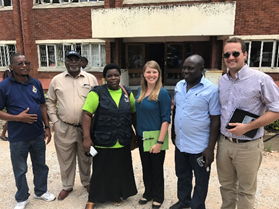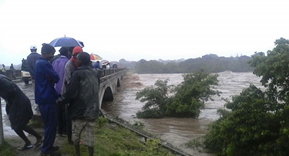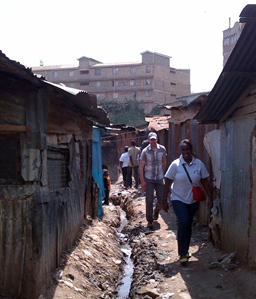Since 2010, CDC has worked with the Zimbabwe Ministry of Health and Child Welfare to investigate suspected outbreaks of typhoid fever; a life-threatening illness caused by a germ called Salmonella Typhi. In January 2017, teams from CDC-Atlanta, CDC-Zimbabwe, CDC-Kenya, and the Kenya Medical Research Institute assisted the Ministry with an investigation of a typhoid fever outbreak in Zimbabwe. The team helped improve laboratory testing to identify cases of illness, define the size and extent of the outbreak, and determine how to keep it from spreading.
Typhoid fever can spread if sewage contaminated with the germ gets into the water people use for drinking or washing food. The results of the Zimbabwe investigation showed that in highly populated areas of the city many old and damaged boreholes, which are wells drilled deep into the ground to access underground water, were contaminated with feces (poop). The region had experienced record rainfall and flooding, which caused sewer systems to overflow and contaminate the city’s water sources, making people sick.
By responding to this outbreak, CDC helped improve the national capacity to detect and respond to future typhoid cases before they can spread the disease and cause outbreaks. Specific CDC actions included:
- Building laboratory staff’s technical capabilities to quickly diagnose typhoid fever
- Strengthening epidemiologic surveillance systems for faster analysis and interpretation of data
- Supporting the creation of a national response plan for typhoid fever
- Assisting with linking laboratory test results to clinical information from patients to help guide decisions by healthcare providers, such as which antibiotics to use
- Streamlining the routes and means of communication between the national command center and rural health facilities
- Assisting with health promotion about the importance of good sanitation and hygiene practices
This outbreak and others demonstrate the impact that typhoid fever continues to have in sub-Saharan African countries and highlight the continued importance of typhoid fever prevention and control in Africa.
For more information, see Notes from the Field: Salmonella Typhi Infections Associated with Contaminated Water in Zimbabwe.


